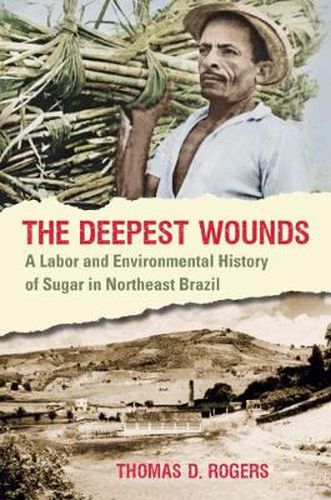Readings Newsletter
Become a Readings Member to make your shopping experience even easier.
Sign in or sign up for free!
You’re not far away from qualifying for FREE standard shipping within Australia
You’ve qualified for FREE standard shipping within Australia
The cart is loading…






In The Deepest Wounds , Thomas D. Rogers traces social and environmental changes over four centuries in Pernambuco, Brazil’s key northeastern sugar-growing state. Focusing particularly on the period from the end of slavery in 1888 to the late twentieth century, when human impact on the environment reached critical new levels, Rogers confronts the day-to-day world of farming–the complex, fraught, and occasionally poetic business of making sugarcane grow. Renowned Brazilian sociologist Gilberto Freyre, whose home state was Pernambuco, observed,
Monoculture, slavery, and latifundia–but principally monoculture–they opened here, in the life, the landscape, and the character of our people, the deepest wounds.
Inspired by Freyre’s insight, Rogers tells the story of Pernambuco’s wounds, describing the connections among changing agricultural technologies, landscapes and human perceptions of them, labor practices, and agricultural and economic policy. This web of interrelated factors, Rogers argues, both shaped economic progress and left extensive environmental and human damage. Combining a study of workers with analysis of their landscape, Rogers offers new interpretations of crucial moments of labor struggle, casts new light on the role of the state in agricultural change, and illuminates a legacy that influences Brazil’s development even today. |Rogers traces social and environmental changes over four centuries in Pernambuco, Brazil’s key northeastern sugar-growing state. Focusing particularly on the period from the end of slavery in 1888 to the late twentieth century, when human impact on the environment reached critical new levels, Rogers confronts the day-to-day world of farming–the complex, fraught, and occasionally poetic business of making sugarcane grow. Combining a study of workers with analysis of their landscape, Rogers offers new interpretations of crucial moments of labor struggle, casts new light on the role of the state in agricultural change, and illuminates a legacy that influences Brazil’s development even today.
$9.00 standard shipping within Australia
FREE standard shipping within Australia for orders over $100.00
Express & International shipping calculated at checkout
In The Deepest Wounds , Thomas D. Rogers traces social and environmental changes over four centuries in Pernambuco, Brazil’s key northeastern sugar-growing state. Focusing particularly on the period from the end of slavery in 1888 to the late twentieth century, when human impact on the environment reached critical new levels, Rogers confronts the day-to-day world of farming–the complex, fraught, and occasionally poetic business of making sugarcane grow. Renowned Brazilian sociologist Gilberto Freyre, whose home state was Pernambuco, observed,
Monoculture, slavery, and latifundia–but principally monoculture–they opened here, in the life, the landscape, and the character of our people, the deepest wounds.
Inspired by Freyre’s insight, Rogers tells the story of Pernambuco’s wounds, describing the connections among changing agricultural technologies, landscapes and human perceptions of them, labor practices, and agricultural and economic policy. This web of interrelated factors, Rogers argues, both shaped economic progress and left extensive environmental and human damage. Combining a study of workers with analysis of their landscape, Rogers offers new interpretations of crucial moments of labor struggle, casts new light on the role of the state in agricultural change, and illuminates a legacy that influences Brazil’s development even today. |Rogers traces social and environmental changes over four centuries in Pernambuco, Brazil’s key northeastern sugar-growing state. Focusing particularly on the period from the end of slavery in 1888 to the late twentieth century, when human impact on the environment reached critical new levels, Rogers confronts the day-to-day world of farming–the complex, fraught, and occasionally poetic business of making sugarcane grow. Combining a study of workers with analysis of their landscape, Rogers offers new interpretations of crucial moments of labor struggle, casts new light on the role of the state in agricultural change, and illuminates a legacy that influences Brazil’s development even today.